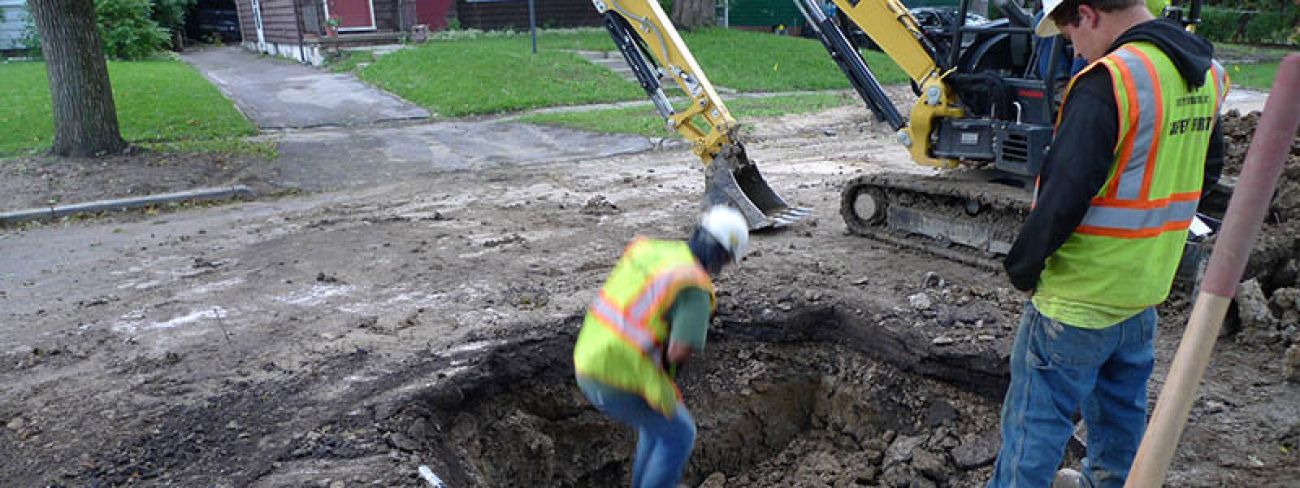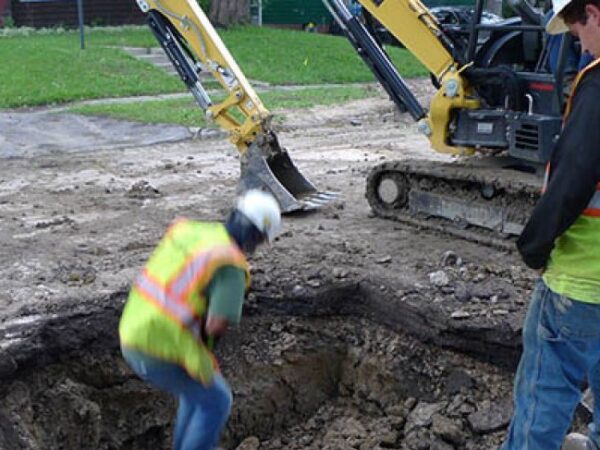
By Kelly House, Bridge Michigan
The Great Lakes News Collaborative includes Bridge Michigan; Circle of Blue; Great Lakes Now at Detroit Public Television; and Michigan Radio, Michigan’s NPR News Leader; who work together to bring audiences news and information about the impact of climate change, pollution, and aging infrastructure on the Great Lakes and drinking water. This independent journalism is supported by the Charles Stewart Mott Foundation. Find all the work HERE.
- Flint agreed to replace all lead pipes by 2020, but has repeatedly missed deadlines
- About 1,000 Flint homes still need pipes checked for lead and thousands more may have damage from past work
- A federal judge gave the city until Aug. 1 to finish the job
A federal judge has given the city of Flint until August 1 to finish a lead line replacement job that has dragged on for three years beyond its original deadline.
In an order issued Friday, U.S. District Court Judge David M. Lawson also gave city officials until May to figure out which Flint residents’ yards are still ripped up from past lead line replacement work. The city must then restore cracked sidewalks and potholed yards.
The order was issued about two weeks after Bridge Michigan reported that many residents still have gaping holes in their yards or chunks missing from their sidewalks after work crews excavated their service line and then failed to clean up the mess.
If the city deems a yard already restored, it must leave a door hanger notice at the resident’s home alerting the resident that city officials believe their work is done. That’s meant to give residents a chance to dispute those findings if they feel differently.
The ruling stems from a settlement Flint and the state reached with Flint residents and advocacy groups (Concerned Pastors for Social Action, Flint resident Melissa Mays, the Natural Resources Defense Council and the ACLU of Michigan) in 2017 following the Flint water crisis, when decisions by a state-appointed emergency manager contributed to lead contamination in city drinking water.
That 2017 settlement requires the city to excavate some 31,500 of service lines that feed city water into residents’ homes. The city agreed to replace service lines that could contain lead by January 2020.
But city officials have repeatedly failed to meet deadlines or provide the plaintiffs with required progress reports on the $97 million effort. Plaintiffs have been in court five times asking a judge to enforce the settlement’s terms.
Flint resident Melissa Mays, a plaintiff in the suit who said her yard is among those still awaiting restoration, panned the city in a Tuesday statement for taking six years and counting to finish work that other cities have done far faster.
“And the work the City has actually done has been disorganized and does not inspire confidence among Flint residents,” Mays said. “We shouldn’t have had to go back to federal court for the fifth time to get the City to finish what it promised.”
City officials have blamed the delays on work stoppages caused by the COVID-19 pandemic, supply shortages and unreliable contractors.
Flint Mayor Sheldon Neeley told Bridge earlier this month that contractor turnover led to recordkeeping issues that have taken time to resolve.
In a statement Tuesday, Flint City Attorney William Kim said the city is “well on our way” to meeting the new August deadline.
“We are committed to getting the lead out for the health and safety of Flint residents,” Kim said.
After plaintiffs filed the latest request for a court order, city officials agreed to meet new deadlines to excavate remaining pipes and figure out which yards still need restoration. But the city rejected plaintiffs’ request for notification hangers to be placed on residents’ doors, arguing the settlement doesn’t require it.
Lawson’s order nevertheless requires the city to take that step.
“The City put itself in this position by its mismanagement of the service line replacement process,” Lawson wrote. “It has grossly exaggerated the ‘burden’ that would be imposed by the inspection and notice procedures proposed by the plaintiffs, and those remedial measures are well within the means available to the Court to enforce the Settlement Agreement it has been supervising for almost five years.”
Plaintiffs estimate more than a thousand homes still need excavations to determine whether they are connected to lead service lines, and potentially thousands more could still need yard or pavement restorations.
Local activists see the pipe replacement effort as one of the final steps in Flint’s recovery from the water crisis that began in 2014. That’s when state officials approved a cost-cutting switch of Flint’s drinking water supply from Detroit’s system to the corrosive Flint River, without requiring treatment to keep lead from leaching out of aging lead pipes.
The city switched back in October 2015, but health experts advise Flint residents to drink only filtered water until the lead line replacement effort is finished.
In a Tuesday statement, Natural Resources Defense Council attorney Addie Rolnick called the court order “a win,” but added that “Flint residents will not get the justice they deserve until every resident…sees their lead pipe replaced and their property repaired.”
Catch more news at Great Lakes Now:
Jury can’t reach verdict in engineers’ Flint water trial
Court kills Flint water charges against ex-governor, others
Featured image: The effort to remove all of Flint’s lead service lines was originally supposed to finish in 2020, but has faced years of delays. (Bridge file photo)




